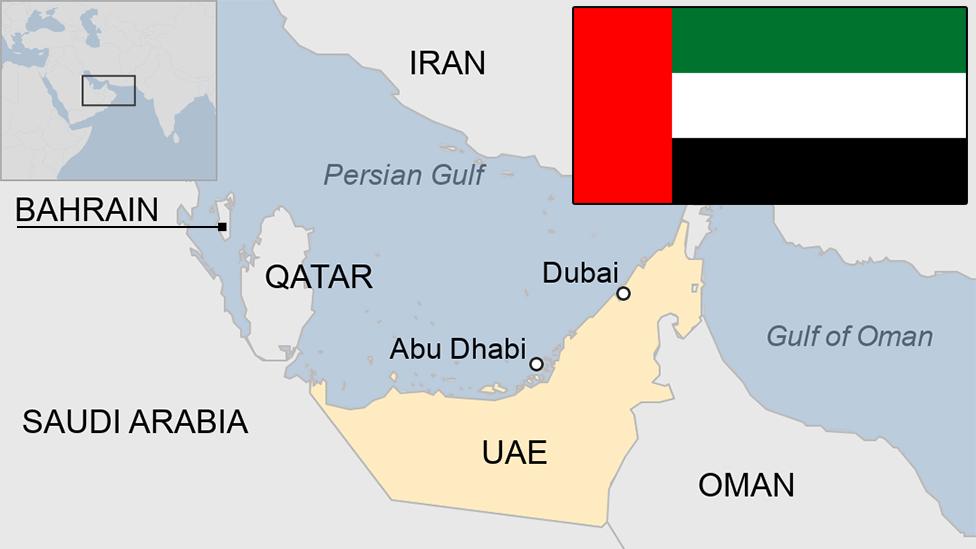Social media brings change in Gulf despite efforts at control
- Published
- comments
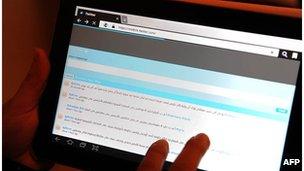
Efforts to legislate online debate are having mixed results in the Gulf
A recent decision by the United Arab Emirates to tighten restrictions on internet use has highlighted attempts by the authorities in Gulf states to staunch the flood of comment and criticism appearing on social media websites.
The amendments to the UAE's existing law on internet crime were announced last month in a decree by President Sheikh Khalifa bin Zayed al-Nuhayyan, the ruler of Abu Dhabi.
It says citizens who create or run a website or use the internet to deride or damage the state or its institutions face up to three years in prison. Foreign nationals will be deported.
The institutions include the president, vice-president, any of the rulers of the federation's seven emirates, their crown princes and deputy rulers, as well as the national flag, national anthem, or any symbols of the state.
The law also prohibits "information, news, caricatures or any other kind of pictures" that authorities believe could threaten security or "public order".
Sheikh Khalifa issued the decree just hours after the UAE was elected to a three-year term on the UN Human Rights Council, after standing unopposed for one of the five vacant seats reserved for Asian states.
Although some provisions of the legislation were aimed at preventing the proliferation of racist or sectarian views online, Human Rights Watch (HRW) said its principal effect was to place severe restrictions on the rights to free expression and free association and assembly.
Joe Stork, the group's deputy Middle East director, says it has already had an impact on social media usage.
"It has had a chilling effect," he told the BBC, adding that prominent UAE activists had "stopped tweeting".
"Who decides what constitutes an insult, who determines where the red line is?" he asked. "It shows the utter intolerance of any kind of public criticism of the government"
'Indiscriminate thieves'
Elsewhere in the Gulf, a lawyer for the prominent Qatari poet Mohammed al-Ajami - also known as Mohammed Ibn al-Dheeb - said his client was sentenced last week to life in prison.
He was convicted by a security court of insulting the country's "symbols" and encouraging the overthrow of its ruling system.
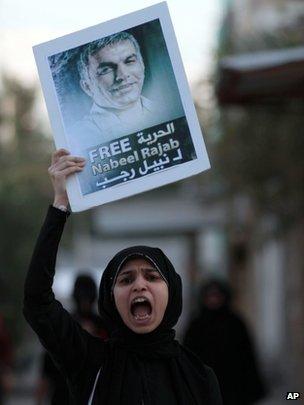
Friends are operating Nabeel Rajab's account as he serves a sentence in Bahrain
The case against him is said to be based on a 2010 poem critical of the Emir, Sheikh Hamad al-Thani, but activists believe the Qatari authorities were angered by a 2011 poem in which he denounced "all Arab governments" as "indiscriminate thieves".
Mr Ajami has been in solitary confinement since his arrest in November 2011.
And in Oman, a number of online activists were sentenced in July to jail terms from one year to 18 months for "defaming" Sultan Qaboos Bin Saeed.
The previous month, the Omani authorities threatened a crackdown, with Muscat's public prosecutor threatening all appropriate legal measures against those who made "inciting calls".
Many have criticised the Omani government's failure to carry out reforms promised in 2011 following demonstrations.
Another Gulf activist, Nabeel Rajab, is currently serving a three-year prison term in Bahrain.
His Twitter account, which has over 100,000 followers, says: "Because of tweets, I have been in jail since 9 July, sentenced to three years in prison. My friends are operating my account on my behalf."
The Bahrain government, however, says the sentence was for inciting illegal acts by encouraging people to protest and attend banned rallies.
In Bahrain all public gatherings and rallies have been banned, although the government insists the measure is only temporary.
Twitter takes off
The picture, though, is not all bleak.
The Saudi blogger, Ahmed al-Omran, external, says that when he set up his Twitter account in 2006 virtually no-one in his country was using the micro-blogging service.
"Now it has exploded," he told the BBC from Jeddah. "Saudi Arabia has the fastest growing population of Twitter users in the world. In one month last year it increased by 3000%."
"It is redefining how boys and girls get to know each other. "
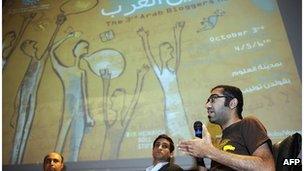
Ahmed al-Omran says Twitter is enabling big social changes in Saudi Arabia
That constitutes a huge shift in social dynamics and relationships in a still deeply conservative country.
So can social media change a region where royal families have ruled with an autocratic hand for decades?
As in the West, much of the Gulf's social media is consumed with celebrity watching, sports and day-to-day chatter.
But because the Gulf has such a large youth population, one that is educated and very new-media savvy, some of the conversation bouncing around in cyberspace is, unsurprisingly, about the need for change, especially in the wake of the Arab Spring.
And that can be dangerous. Governments in the Gulf have little tolerance for calls for deep reforms and even less when individual members of the ruling families come under fire.
They have sophisticated monitoring systems to accompany far-reaching laws and tend to come down hard when they believe a red line has been crossed.
Red line 'receding'
But even though monitoring is extensive, the sheer volume of online comment and conversation makes policing internet use in the Gulf a huge and, some would say, impossible challenge to meet.
Steve Royston, a businessman based in Bahrain who blogs regularly on Gulf matters, believes that, though caution remains the byword, social media is a force for change.
He says: "The red line is still there but it is receding."
Writing in his blog, external, Mr Royston applauded a recent podcast conversation in English now gaining a measure of internet fame. It is called "That Jeddah Podcast", external.
"The broadcasters are bright, articulate and insightful - serious yet full of life and humour. Any young Westerner listening to their conversation is likely to think: 'Wow - these people are just like me!' And guess what - in all that is important they are."
Of course, just the idea that three people - a man and two women - unrelated could have a public conversation about freedom of expression, attitudes towards women, sexuality and other taboos in the rigid social climate of Saudi Arabia would be otherwise unthinkable.
As Mr Royston notes: "The taboo about mixing of the sexes does not apply online."
And as the online world breaks down walls and steps into previously forbidden territory the old, official world seems baffled about how to deal with it.
'Unstoppable tide'
Legislation, sophisticated snooping, arrests and even jail will have their effect on high-profile activists like Nabeel Rajab and others.
But they are a distinct and vocal online minority. Others who are less vociferous or more nuanced continue to push the envelope. There is, as one blogger told the BBC, "a subtle dancing around certain issues".
After all, says a young Saudi blogger, "the government can't jail everyone who says something they don't like to hear".
That is a point not lost on older commentators like Jamal Khashoggi, the editor-in-chief of the new Al Arab News Channel in Saudi Arabia.
"Twitter is becoming the newspaper that we never had. It is having an effect, and we haven't seen all of it yet," he told a Washington conference on US-Arab affairs in October.
"What could Twitter, what could Facebook do to affect change and reform in Saudi Arabia? God only knows. But it has begun to happen."
Indeed, says the young Saudi blogger: "This is a tide, not just here but throughout the whole world. Saudi Arabia cannot stop it."
- Published31 July 2012
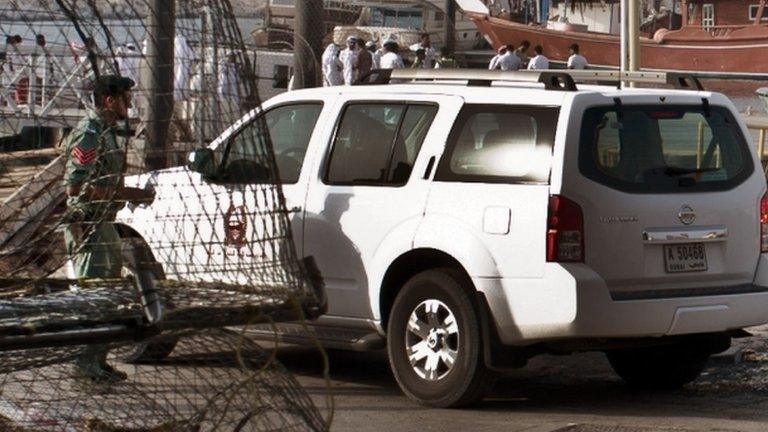
- Published28 November 2011
- Published18 July 2011
- Published7 September 2023
